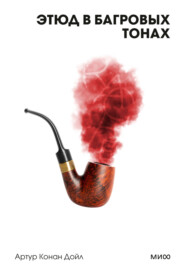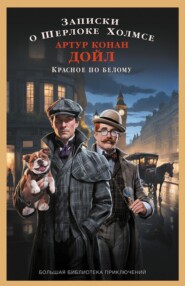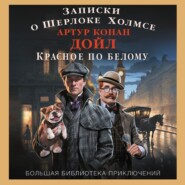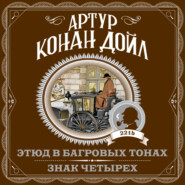По всем вопросам обращайтесь на: info@litportal.ru
(©) 2003-2025.
✖
Приключения Шерлока Холмса / The Adventures of Sherlock Holmes
Настройки чтения
Размер шрифта
Высота строк
Поля
“What then?”
“The knees of his trousers.”
“And what did you see?”
“What I expected to see.”
“Why did you strike the ground?”
“My dear doctor, this is a time for action, not for talk. We are spies in an enemy’s country. We know something of Saxe-Coburg Square. Let us now see some other places.”
The road in which we found ourselves as we turned round the corner from Saxe-Coburg Square was a great contrast to it. It was one of the main arteries with busy traffic. It was difficult to realize as we looked at the line of fine shops and business offices that they were really on the other side of the quiet square which we had just left.
“Let me see,” said Holmes, standing at the corner and glancing along the street, “I should like to remember the order of the houses here. There is Mortimer’s, the tobacconist, the little newspaper shop, the Coburg branch of the City and Suburban Bank[16 - the City and Suburban Bank – Городской и пригородный банк (вымышленный банк)], the Vegetarian Restaurant. And now, Doctor, we’ve done our work.
“Do you want to go home?”
“Yes.”
“And I have some business to do which will take some hours. This business at Coburg Square is serious.”
“Why serious?”
“A crime is being prepared. I believe that we shall be in time to stop it. I shall want your help tonight.”
“At what time?”
“At ten. There may be some danger, so put your army revolver in your pocket.” And he disappeared in the crowd.
I must say I always felt stupid when I was with Sherlock Holmes. I had heard what he had heard, I had seen what he had seen, and yet from his words it was evident that he saw clearly not only what had happened but what was going to happen, while to me the whole business was still a mystery. As I drove home to my house in Kensington I thought over it. Where were we going, and what were we to do? I had the hint from Holmes that this pawnbroker’s assistant was a criminal. But I could not think what he was up to and then decided that the night would bring an explanation.
III
It was a quarter-past nine when I started from home and made my way to Baker Street. Two cabs were standing at the door, and as I entered the house I heard voices from above. On entering his room I found Holmes speaking to two men, one of whom I recognized as Peter Jones, the official police agent, while the other was a long, thin, sad-faced man, with a hat and very respectable coat.
“Ha! Our party is complete. Watson, I think you know Mr. Jones, of Scotland Yard? Let me introduce you to Mr. Merryweather, who is to be our companion in tonight’s adventure,” said Holmes.
“You may have confidence in Mr. Holmes, sir,” said the police agent. “He has his own methods, which are a little too theoretical and fantastic, but once or twice he has been more correct than the police.”
“Oh, if you say so, Mr. Jones, it is all right,” said the stranger. “Still, I miss my game of cards. It is the first Saturday night for twenty-seven years that I have not played cards.”
“I think you will find,” said Sherlock Holmes, “that the play tonight will be more exciting. For you, Mr. Merryweather, the stake will be some 30,000 pounds; and for you, Jones, it will be the man on whom you wish to lay your hands.
“John Clay, the murderer, thief, and forger. He’s a young man, Mr. Merryweather, but he is at the head of his profession, one of the most dangerous in London. He’s a remarkable man. His grandfather was a duke, and he himself has been to Eton[17 - Eton – Итон, привилегированная школа для мальчиков] and Oxford. His brain is as good as his fingers. I’ve been on his track for years and have never had any evidence against him yet.”
“I’ve met Mr. John Clay once or twice, and I agree with you that he is at the head of his profession. It is past ten, however, and it is time to start.”
We drove through a labyrinth of streets until we found ourselves in Farrington Street.
“We are close there now,” my friend remarked. “This fellow Merryweather is a bank director, and personally interested in the matter. I wished to have Jones with us also. He is not a bad fellow, though an absolute fool in his profession, but he is as brave as a bulldog.”
We had reached the same crowded street in which we had been in the morning. Mr. Merryweather opened a side door for us. We saw a small corridor, which ended in a very massive iron gate. This also was opened, and we went downstairs to another iron gate. Mr. Merryweather showed us down a dark corridor to a third door, and into a huge cellar with massive boxes.
“You are not very vulnerable from above,” Holmes remarked as he looked about him.
“Nor from below,” said Mr. Merryweather, striking his stick on the floor. “Why, it sounds quite hollow!” he remarked, looking up in surprise.
“I must ask you to be a little more quiet!” said Holmes. “Would you sit down on one of those boxes, and be quiet?”
Mr. Merryweather sat down on a box, while Holmes fell on his knees on the floor and, with a lens, began to examine it. A few moments later he sprang to his feet again and put his lens in his pocket.
“We have at least an hour,” he remarked, “for they can hardly do anything until the pawnbroker is in bed. Then they will not lose a minute, for the sooner they do their work the longer time they will have for their escape. We are at present, Doctor, in the cellar of the City branch of one of the biggest London banks. Mr. Merryweather is the director, and he will explain to you why the criminals are interested in this cellar at present.”
“It is our French gold,” whispered the director. “We have had several warnings.”
“Your French gold?”
“Yes. Some months ago we borrowed 30,000 napoleons from the Bank of France. It has become known that the money is still lying in our cellar. The box on which I sit contains 2,000 napoleons. The amount is much larger at present than is usually kept in a single branch office, and the directors have had fears on the matter.”
“And they were right about that,” observed Holmes. “And now it is time to put the screen over the lantern.”
“And sit in the dark?”
“I am afraid so. The enemy is very near and we cannot risk the presence of a light. And, first of all, we must choose our positions. I shall stand behind this box, and you will be behind those. If they fire, Watson, shoot them down.”
I put my revolver on the box behind which I hid. Holmes shot the slide across the front of his lantern and left us in such an absolute darkness as I had never seen before.
“They have one way of escape,” whispered Holmes. “That is back through the house into Saxe-Coburg Square. I hope that you have done what I asked you, Jones?”
“l have an inspector and two officers waiting at the front door.”
“Then we must be silent and wait.”
What a time it seemed! We waited for only an hour and a quarter, but it seemed to me that it was all the night.
Suddenly we saw a light. At first it was only a spark on the floor. Then it became a yellow line, and then a hand appeared; a white hand, which felt about in the centre of the little area of light. With a loud noise, one of the broad, white stones turned over on its side and left a hole. I saw a boyish face, which looked about, and then a man drew himself up into the cellar. In another moment he stood at the side of the hole and was helping his companion, small like himself, with a pale face and very red hair.
Sherlock Holmes sprang out and seized the first man by the collar. The other dived down the hole, and I saw the first man holding a revolver, but Holmes struck the man’s hand, and the revolver fell on the floor.
“It’s no use, John Clay,” said Holmes. “You have no chance at all.”
“So I see,” the other answered. “But I think that my friend is all right.”
“There are three men waiting for him at the door,” said Holmes.
“Oh, indeed! You did your work very thoroughly. I must compliment you.”
“And I you,” Holmes answered. “Your red-headed idea was very new and effective.”
“The knees of his trousers.”
“And what did you see?”
“What I expected to see.”
“Why did you strike the ground?”
“My dear doctor, this is a time for action, not for talk. We are spies in an enemy’s country. We know something of Saxe-Coburg Square. Let us now see some other places.”
The road in which we found ourselves as we turned round the corner from Saxe-Coburg Square was a great contrast to it. It was one of the main arteries with busy traffic. It was difficult to realize as we looked at the line of fine shops and business offices that they were really on the other side of the quiet square which we had just left.
“Let me see,” said Holmes, standing at the corner and glancing along the street, “I should like to remember the order of the houses here. There is Mortimer’s, the tobacconist, the little newspaper shop, the Coburg branch of the City and Suburban Bank[16 - the City and Suburban Bank – Городской и пригородный банк (вымышленный банк)], the Vegetarian Restaurant. And now, Doctor, we’ve done our work.
“Do you want to go home?”
“Yes.”
“And I have some business to do which will take some hours. This business at Coburg Square is serious.”
“Why serious?”
“A crime is being prepared. I believe that we shall be in time to stop it. I shall want your help tonight.”
“At what time?”
“At ten. There may be some danger, so put your army revolver in your pocket.” And he disappeared in the crowd.
I must say I always felt stupid when I was with Sherlock Holmes. I had heard what he had heard, I had seen what he had seen, and yet from his words it was evident that he saw clearly not only what had happened but what was going to happen, while to me the whole business was still a mystery. As I drove home to my house in Kensington I thought over it. Where were we going, and what were we to do? I had the hint from Holmes that this pawnbroker’s assistant was a criminal. But I could not think what he was up to and then decided that the night would bring an explanation.
III
It was a quarter-past nine when I started from home and made my way to Baker Street. Two cabs were standing at the door, and as I entered the house I heard voices from above. On entering his room I found Holmes speaking to two men, one of whom I recognized as Peter Jones, the official police agent, while the other was a long, thin, sad-faced man, with a hat and very respectable coat.
“Ha! Our party is complete. Watson, I think you know Mr. Jones, of Scotland Yard? Let me introduce you to Mr. Merryweather, who is to be our companion in tonight’s adventure,” said Holmes.
“You may have confidence in Mr. Holmes, sir,” said the police agent. “He has his own methods, which are a little too theoretical and fantastic, but once or twice he has been more correct than the police.”
“Oh, if you say so, Mr. Jones, it is all right,” said the stranger. “Still, I miss my game of cards. It is the first Saturday night for twenty-seven years that I have not played cards.”
“I think you will find,” said Sherlock Holmes, “that the play tonight will be more exciting. For you, Mr. Merryweather, the stake will be some 30,000 pounds; and for you, Jones, it will be the man on whom you wish to lay your hands.
“John Clay, the murderer, thief, and forger. He’s a young man, Mr. Merryweather, but he is at the head of his profession, one of the most dangerous in London. He’s a remarkable man. His grandfather was a duke, and he himself has been to Eton[17 - Eton – Итон, привилегированная школа для мальчиков] and Oxford. His brain is as good as his fingers. I’ve been on his track for years and have never had any evidence against him yet.”
“I’ve met Mr. John Clay once or twice, and I agree with you that he is at the head of his profession. It is past ten, however, and it is time to start.”
We drove through a labyrinth of streets until we found ourselves in Farrington Street.
“We are close there now,” my friend remarked. “This fellow Merryweather is a bank director, and personally interested in the matter. I wished to have Jones with us also. He is not a bad fellow, though an absolute fool in his profession, but he is as brave as a bulldog.”
We had reached the same crowded street in which we had been in the morning. Mr. Merryweather opened a side door for us. We saw a small corridor, which ended in a very massive iron gate. This also was opened, and we went downstairs to another iron gate. Mr. Merryweather showed us down a dark corridor to a third door, and into a huge cellar with massive boxes.
“You are not very vulnerable from above,” Holmes remarked as he looked about him.
“Nor from below,” said Mr. Merryweather, striking his stick on the floor. “Why, it sounds quite hollow!” he remarked, looking up in surprise.
“I must ask you to be a little more quiet!” said Holmes. “Would you sit down on one of those boxes, and be quiet?”
Mr. Merryweather sat down on a box, while Holmes fell on his knees on the floor and, with a lens, began to examine it. A few moments later he sprang to his feet again and put his lens in his pocket.
“We have at least an hour,” he remarked, “for they can hardly do anything until the pawnbroker is in bed. Then they will not lose a minute, for the sooner they do their work the longer time they will have for their escape. We are at present, Doctor, in the cellar of the City branch of one of the biggest London banks. Mr. Merryweather is the director, and he will explain to you why the criminals are interested in this cellar at present.”
“It is our French gold,” whispered the director. “We have had several warnings.”
“Your French gold?”
“Yes. Some months ago we borrowed 30,000 napoleons from the Bank of France. It has become known that the money is still lying in our cellar. The box on which I sit contains 2,000 napoleons. The amount is much larger at present than is usually kept in a single branch office, and the directors have had fears on the matter.”
“And they were right about that,” observed Holmes. “And now it is time to put the screen over the lantern.”
“And sit in the dark?”
“I am afraid so. The enemy is very near and we cannot risk the presence of a light. And, first of all, we must choose our positions. I shall stand behind this box, and you will be behind those. If they fire, Watson, shoot them down.”
I put my revolver on the box behind which I hid. Holmes shot the slide across the front of his lantern and left us in such an absolute darkness as I had never seen before.
“They have one way of escape,” whispered Holmes. “That is back through the house into Saxe-Coburg Square. I hope that you have done what I asked you, Jones?”
“l have an inspector and two officers waiting at the front door.”
“Then we must be silent and wait.”
What a time it seemed! We waited for only an hour and a quarter, but it seemed to me that it was all the night.
Suddenly we saw a light. At first it was only a spark on the floor. Then it became a yellow line, and then a hand appeared; a white hand, which felt about in the centre of the little area of light. With a loud noise, one of the broad, white stones turned over on its side and left a hole. I saw a boyish face, which looked about, and then a man drew himself up into the cellar. In another moment he stood at the side of the hole and was helping his companion, small like himself, with a pale face and very red hair.
Sherlock Holmes sprang out and seized the first man by the collar. The other dived down the hole, and I saw the first man holding a revolver, but Holmes struck the man’s hand, and the revolver fell on the floor.
“It’s no use, John Clay,” said Holmes. “You have no chance at all.”
“So I see,” the other answered. “But I think that my friend is all right.”
“There are three men waiting for him at the door,” said Holmes.
“Oh, indeed! You did your work very thoroughly. I must compliment you.”
“And I you,” Holmes answered. “Your red-headed idea was very new and effective.”

















